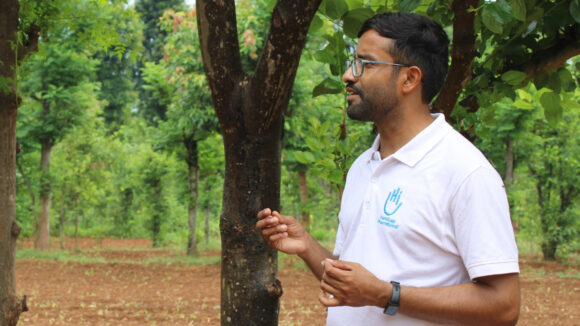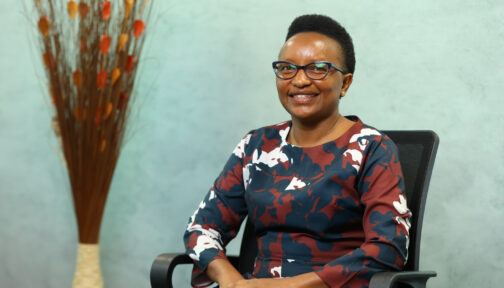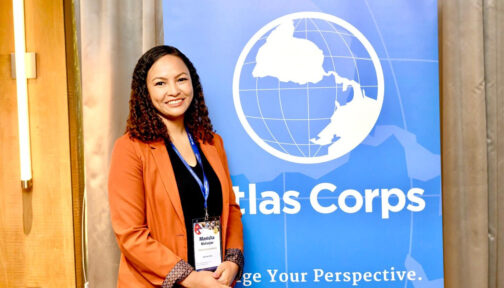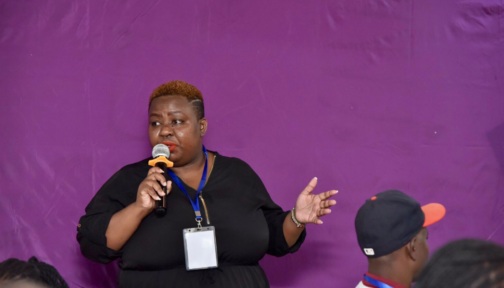Pralhad Gairapipli: “My role is to help raise awareness and create sustainable behaviour change”
Pralhad’s story
“During my school years, when I was growing up in my village, I had a mentor who had a disability. He was one of the most hardworking people I have ever met, and he inspired me from a very early age.
“Around 25 years later, I started working for an international NGO that promotes disability inclusion and inclusive development – Humanity & Inclusion. I had a chance to meet my mentor again and I shared my work with him. I felt proud that he was my first teacher.”
Inclusive sexual and reproductive health and rights
“How people access sexual and reproductive health and rights (SRHR) information and services, can be affected by their gender, disability, stigma, as well as the availability of information and communication about such services.
“These barriers are usually more intense for women and girls with disabilities. Sometimes families and peers can be reluctant for women and girls with disabilities to get married or have a relationship so it’s considered that they do not need access to SRHR services. In this way, they are underestimated and denied their reproductive rights, which can lead to further discrimination and humiliation.
“To eliminate harmful practices and provide better access to services, it’s important that we raise awareness about SRHR in communities and ensure that women and girls with disabilities can make decisions about their own sexual and reproductive health and speak their own minds.”

Pralhad Gairapipli
Regional communications officer, Humanity & Inclusion
The role of communications
“My role as a communications professional is to help raise awareness and create sustainable behaviour change.
“In a community, achieving behaviour change is not always easy. The process involved is gradual and takes time. It involves engaging with the community and taking the time to understand their mindsets and behaviours. It also takes collaborative effort, strategy and contextual knowledge to bring about change.
“One of the most unique aspects of our project involved youth empowerment clubs. These provided adolescent boys and girls with a safe space to access SRHR-related information and share their experiences. The clubs helped them to feel more secure sharing information about what they had learned and gave them the opportunity to act as advocates, who could share information with their wider community and peer groups.
“I had the chance to meet with some of the project participants, including girls with disabilities who now have a better understanding of their rights. It was very fulfilling to see that these girls now know how to ask the right questions about their rights and not hide behind closed doors.
“Another important part of the project has been working closely with organisations of people with disabilities. Through Inclusive Futures, we’ve been able to connect with national-level federations of people with disabilities who work on projects as technical consultants and provide support in different policy-level dialogues with the government of Nepal. The National Federation of the Disabled, Nepal Association for the Welfare of the Blind, National Federation of the Deaf, and Parent Federation of Persons with Intellectual Disabilities collaborate and partner with other federations and international organisations like Humanity & Inclusion in their advocacy and social campaigns.”
“I am passionate about capturing stories of people with disabilities, and I am proudest when I contribute towards enhancing their voices. My background is in journalism and the social sciences, so I have always believed that information is power for people to access and enjoy their rights.
“As a communicator, I want to make communication and information inclusive to ensure that no one is left behind.”
Interested in disability inclusive SRHR?
Find out moreMore from our people

Mellen Marucha: “Our starting point must be ensuring parents understand and embrace inclusive education”
Mellen Kemunto Marucha is the senior programme coordinator at Sense International in Kenya – an Inclusive Futures partner working with and for people with complex and multiple disabilities to ensure they have the right to live, learn and thrive in an inclusive society.

Manisha Maharjan: “Inclusion benefits everyone, not just those directly impacted”
Manisha is project manager for Humanity & Inclusion and leads our education project in Nepal, funded by UK aid under Inclusive Futures.

Esther Mkamori: “Women and girls with disabilities must be consulted and heard”
Esther Mkamori is head of programmes at United Disabled Persons of Kenya (UDPK), the national umbrella organisation of people with disabilities.
